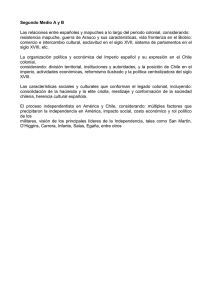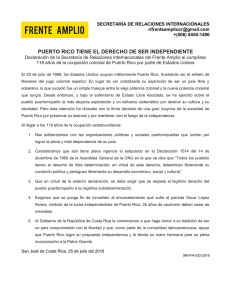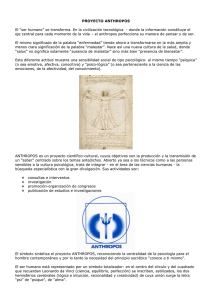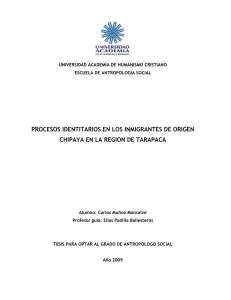Sabine Dedenbach-Salazar Sáenz Institution University of Stirling
Anuncio
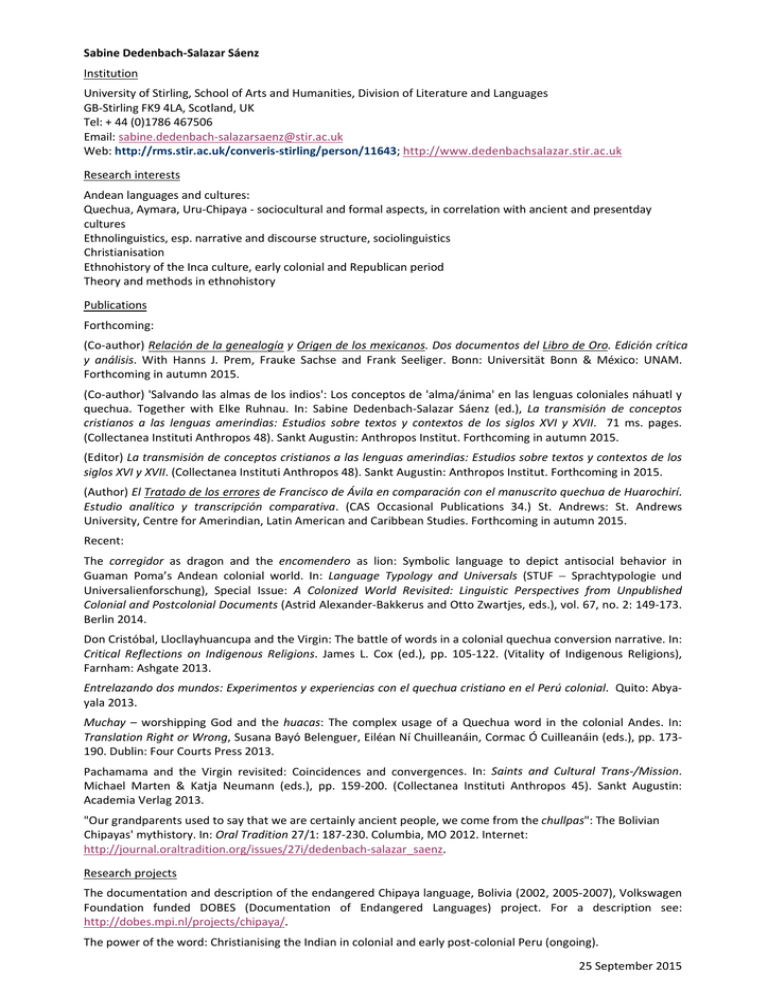
Sabine Dedenbach‐Salazar Sáenz Institution University of Stirling, School of Arts and Humanities, Division of Literature and Languages GB‐Stirling FK9 4LA, Scotland, UK Tel: + 44 (0)1786 467506 Email: sabine.dedenbach‐salazarsaenz@stir.ac.uk Web: http://rms.stir.ac.uk/converis‐stirling/person/11643; http://www.dedenbachsalazar.stir.ac.uk Research interests Andean languages and cultures: Quechua, Aymara, Uru‐Chipaya ‐ sociocultural and formal aspects, in correlation with ancient and presentday cultures Ethnolinguistics, esp. narrative and discourse structure, sociolinguistics Christianisation Ethnohistory of the Inca culture, early colonial and Republican period Theory and methods in ethnohistory Publications Forthcoming: (Co‐author) Relación de la genealogía y Origen de los mexicanos. Dos documentos del Libro de Oro. Edición crítica y análisis. With Hanns J. Prem, Frauke Sachse and Frank Seeliger. Bonn: Universität Bonn & México: UNAM. Forthcoming in autumn 2015. (Co‐author) 'Salvando las almas de los indios': Los conceptos de 'alma/ánima' en las lenguas coloniales náhuatl y quechua. Together with Elke Ruhnau. In: Sabine Dedenbach‐Salazar Sáenz (ed.), La transmisión de conceptos cristianos a las lenguas amerindias: Estudios sobre textos y contextos de los siglos XVI y XVII. 71 ms. pages. (Collectanea Instituti Anthropos 48). Sankt Augustin: Anthropos Institut. Forthcoming in autumn 2015. (Editor) La transmisión de conceptos cristianos a las lenguas amerindias: Estudios sobre textos y contextos de los siglos XVI y XVII. (Collectanea Instituti Anthropos 48). Sankt Augustin: Anthropos Institut. Forthcoming in 2015. (Author) El Tratado de los errores de Francisco de Ávila en comparación con el manuscrito quechua de Huarochirí. Estudio analítico y transcripción comparativa. (CAS Occasional Publications 34.) St. Andrews: St. Andrews University, Centre for Amerindian, Latin American and Caribbean Studies. Forthcoming in autumn 2015. Recent: The corregidor as dragon and the encomendero as lion: Symbolic language to depict antisocial behavior in Guaman Poma’s Andean colonial world. In: Language Typology and Universals (STUF Sprachtypologie und Universalienforschung), Special Issue: A Colonized World Revisited: Linguistic Perspectives from Unpublished Colonial and Postcolonial Documents (Astrid Alexander‐Bakkerus and Otto Zwartjes, eds.), vol. 67, no. 2: 149‐173. Berlin 2014. Don Cristóbal, Llocllayhuancupa and the Virgin: The battle of words in a colonial quechua conversion narrative. In: Critical Reflections on Indigenous Religions. James L. Cox (ed.), pp. 105‐122. (Vitality of Indigenous Religions), Farnham: Ashgate 2013. Entrelazando dos mundos: Experimentos y experiencias con el quechua cristiano en el Perú colonial. Quito: Abya‐ yala 2013. Muchay – worshipping God and the huacas: The complex usage of a Quechua word in the colonial Andes. In: Translation Right or Wrong, Susana Bayó Belenguer, Eiléan Ní Chuilleanáin, Cormac Ó Cuilleanáin (eds.), pp. 173‐ 190. Dublin: Four Courts Press 2013. Pachamama and the Virgin revisited: Coincidences and convergences. In: Saints and Cultural Trans‐/Mission. Michael Marten & Katja Neumann (eds.), pp. 159‐200. (Collectanea Instituti Anthropos 45). Sankt Augustin: Academia Verlag 2013. "Our grandparents used to say that we are certainly ancient people, we come from the chullpas": The Bolivian Chipayas' mythistory. In: Oral Tradition 27/1: 187‐230. Columbia, MO 2012. Internet: http://journal.oraltradition.org/issues/27i/dedenbach‐salazar_saenz. Research projects The documentation and description of the endangered Chipaya language, Bolivia (2002, 2005‐2007), Volkswagen Foundation funded DOBES (Documentation of Endangered Languages) project. For a description see: http://dobes.mpi.nl/projects/chipaya/. The power of the word: Christianising the Indian in colonial and early post‐colonial Peru (ongoing). 25 September 2015
